As a way to recognize the exceptional work of the various members of the INRS community, the offices and centers present key highlights that have impacted INRS research, teaching, students and employees. Whether from a logistical, organizational, institutional, academic or research perspective, the individuals who bring INRS to life have once again demonstrated their commitment to its unique mission.
Here are some of the outstanding achievements of INRS teams and members.

Joint research units
In collaboration with the Université du Québec à Trois-Rivières (UQTR), the Université du Québec en Outaouais (UQO), the Université du Québec à Rimouski (UQAR), the Université du Québec à Chicoutimi (UQAC), and the Université du Québec en Abitibi-Témiscamingue (UQAT), INRS has launched five joint research units (UMRs) on priority and strategic themes for Québec: energy transition materials and technologies, cybersecurity, digital transformation in support of regional development, sustainable health and Indigenous studies. This project, which brings together one-third of Québec’s universities, will consolidate and create research and innovation poles in several regions of Québec.
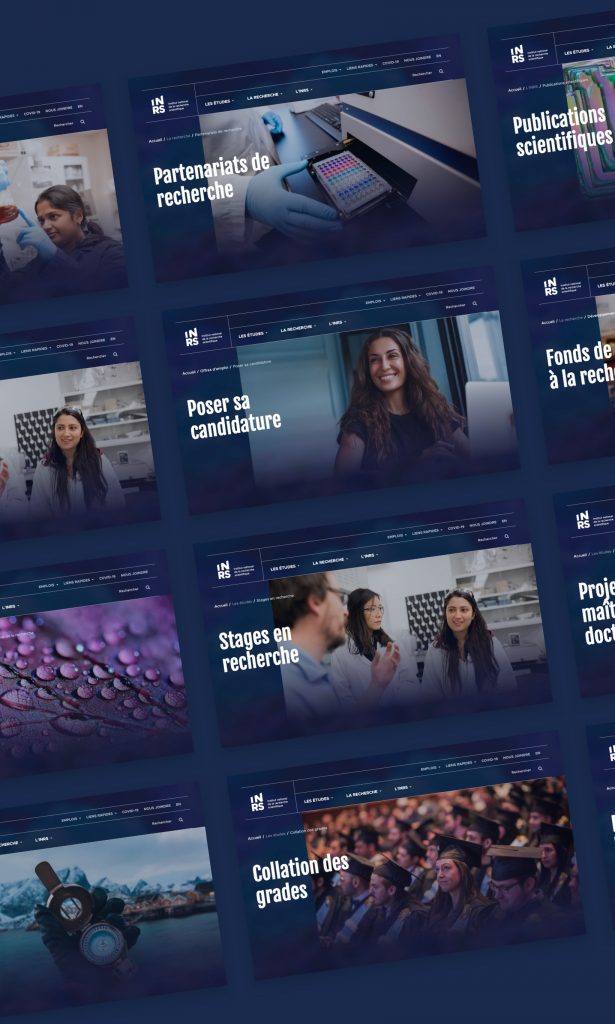
A unique website that reflects INRS’s identity
INRS launched its new website in September 2020. The Communication Department has done a tremendous amount of work to make this happen, in collaboration with several members of our community. This website is distinctive in terms of functionality and content: it serves as the gateway to all the innovative scientific research and remarkable teaching being done at INRS. It also strengthens INRS’s position as a scientific leader in Québec and abroad, while giving a strong voice to the current and future student community.

Equity, Diversity, and Inclusion Committee
Through its strategic plan, INRS is committed to providing an equitable, diverse, and inclusive learning, research and working environment for all members of its community, so that each person feels respected and valued. To this end, INRS submitted an action plan to the Canada Research Chairs Secretariat in 2020. One of the achievements of this plan is the Inclusivement vôtres ! writing guide, which helped INRS to update its communication practices and implement inclusive writing.
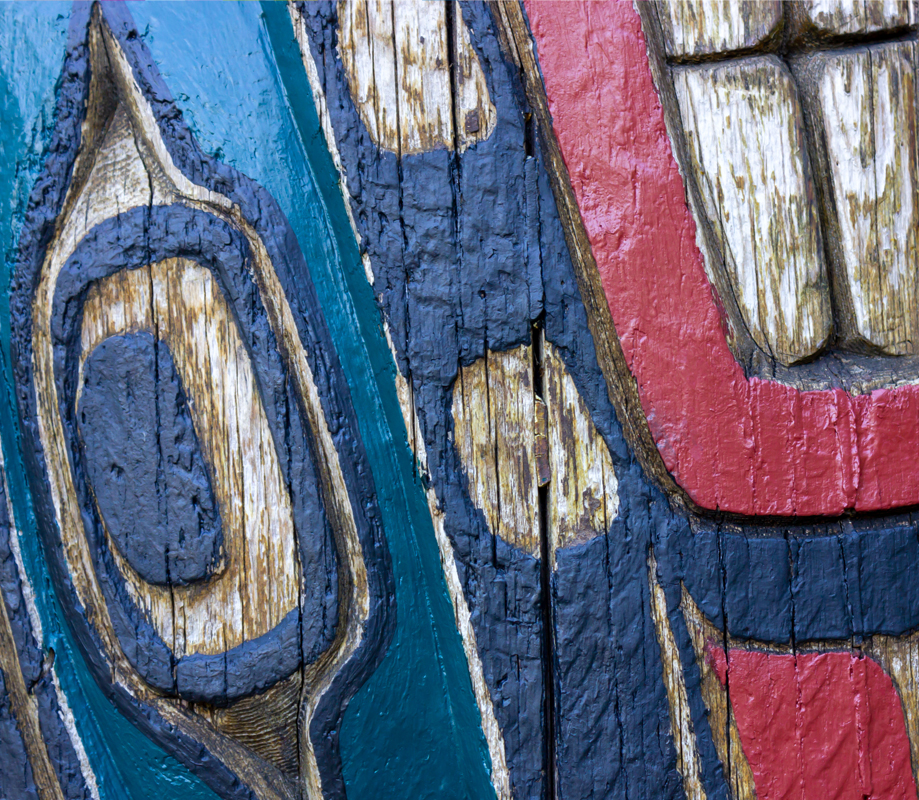
Indigenous Affairs Strategic Direction Committee
INRS wants to ensure that research and teaching carried out by members of its community, wherever and whenever it takes place, is done in accordance with the principles of reconciliation and the provisions of the United Nations Declaration on the Rights of Indigenous Peoples. Accordingly, INRS has established in 2021 the Indigenous Affairs Strategic Direction Committee, which will create new opportunities for partnerships while maintaining and building harmonious and constructive relationships with Indigenous peoples.

A scientific program reflecting INRS’s community
The Scientific Direction mobilized faculty members to develop a unifying and institutional scientific program. For the first time, this program will encompass each of the INRS centers’ programs. Advocating a global vision of INRS’ priorities, it will reinforce interdisciplinarity and cross-sectorial research while promoting the emergence of innovative research areas and sectors.

Restructuring of the Scientific Direction
The Scientific Direction has managed to develop numerous projects, along with the arrival of a Scientific Director, an Assistant Director, and a new Director of Research. The creation of the Partnerships Development Office has also enhanced the range of services offered to the community. This office supports INRS community members in their entrepreneurial endeavours as well as in their collaborations and research initiatives with an institutional scope.

Improving services to student and faculty members
To better respond to the needs of student and faculty members and to meet the new challenges created by the COVID-19 pandemic, INRS hired a psychologist, and mandated a research officer to improve the pedagogical services offered.
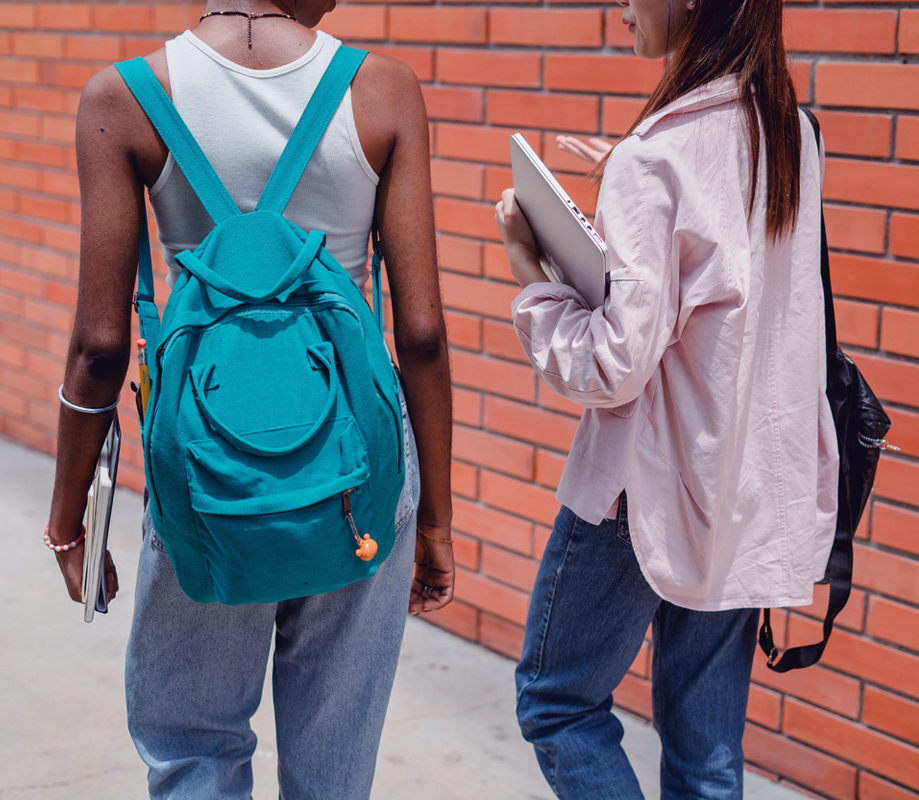
Providing better support to students outside Québec and Canada
International students are an important part of the INRS community. A research officer for Student Life Office has been mandated to develop an action plan to understand the specific issues affecting this group of students and to raise awareness among concerned employees about the future of international students.

Standardization of the internal complaint process
The internal complaint process has been standardized and simplified to ensure better understanding and application of the following normative documents: Code of Ethics for the INRS Community; Directors’ Code of Ethics and Good Practices, Disclosure of Wrongdoing Directive; Harassment, Discrimination, and Incivility Policy; Policy against Sexual Violence; Policy on Safety and Proper Conduct of Activities. A one-stop-shop for complaints has also been created.

Management of conflicts of interest and business involvement of faculty members
The Conflict of Interest Declaration form has been revised to include procedures for dealing with potential situations of conflict of interest arising from the involvement of researchers in businesses. This process was developed with the Syndicat des professeurs(es) de l’Institut national de la recherche scientifique (SPINRS), with whom a letter of agreement was signed. From now on, each faculty member can be involved in a company’s activities according to contractual terms and conditions, while respecting the Code of Ethics of the INRS Community and fair use of resources.

Contribution to INRS’s digital shift
The Archives and Document Management Department contributed to INRS’s digital shift, along with the IT Department and the process optimization and risk management consultant. Their work has led to the implementation of technological tools facilitating information management and project management, including Microsoft 365 and the ConsignO digital signature platform.
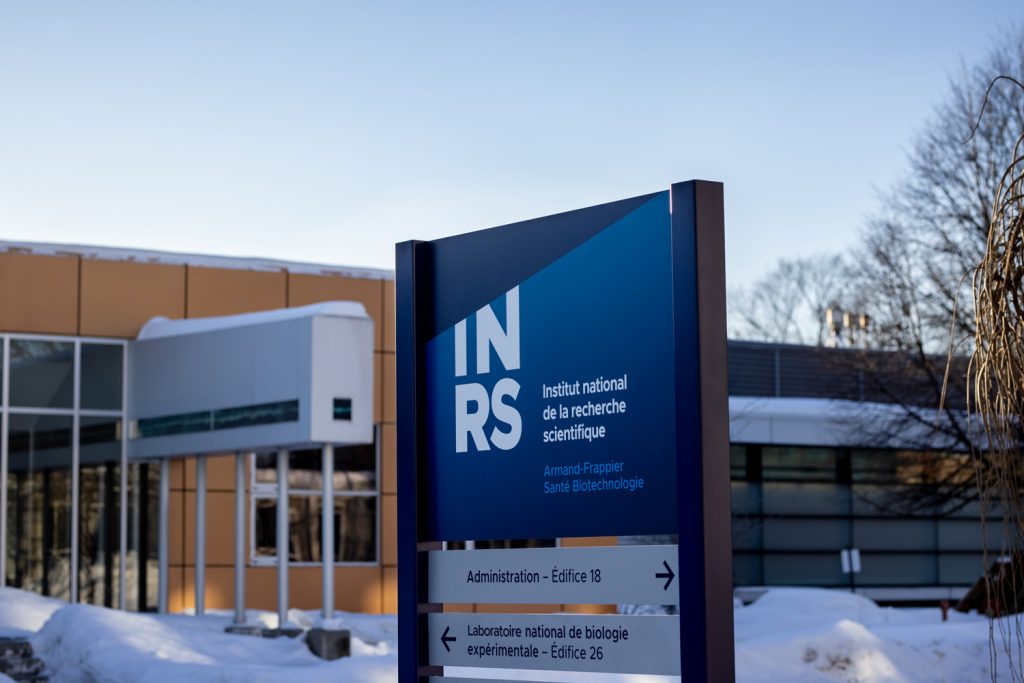
Research at the core of the National Experimental Biology Laboratory
The team at the National Experimental Biology Laboratory (NELB) provided ongoing service to ensure the continuation of research, some of which has been carried out for years, despite the pandemic. Team members were creative in responding to material shortages, particularly for masks. The NEBL was able to maintain daily operations of its animal facility throughout the lockdown, and its members ensured the well-being of the animals despite the risks associated with COVID-19. The veterinary and animal supervision teams were particularly involved in maintaining the Laboratory’s operations.
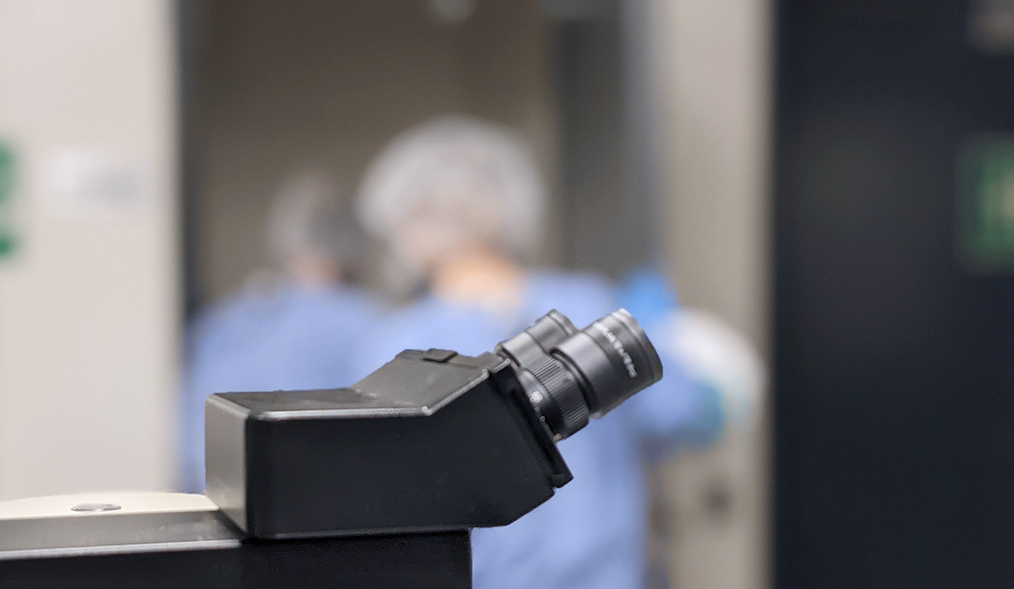
Improvements to our research facilities
The Facilities Services team completed the renovation of two Level 3 containment laboratories at the Armand-Frappier Santé Biotechnologie Research Centre. With the support of the Buildings and Equipment Services and the workplace health and safety team, the Facilities Services team was resourceful in meeting the challenges of the renovation and obtaining specialized materials during a pandemic. These laboratories allow research teams to work safely on viruses such as COVID-19. In addition, they will help INRS to stand out in virus-related research.

INRS, a reference for all Québec universities
Aiming to achieve proper management of resources, the Finances team has set up a fixed asset registry which allows INRS to pay its suppliers more efficiently, among other things. INRS was the first university in Quebec to be able to provide the actual status of its scientific equipment, a requirement now demanded by the Ministère de l’Enseignement supérieur. This registry will be of great use to the Scientific Direction during the evaluation of major infrastructures.

Lockdown and duration of studies
When the pandemic led to the closure of INRS in March 2020, the Management Direction proposed to the executive committee to implement a fund early in the fiscal year to provide financial support to the student community. These have helped to mitigate the impact of the lockdown period on the duration of their studies.

First universal parental leave program for students
INRS is the first university in Québec to offer a universal parental leave program to its students. In collaboration with various departments, the Management Direction has developed a pilot project aimed at the student community and research staff members whose salary depends on grants. This program demonstrates INRS’s strong desire to offer greater equity within the institution and avoids financial pressure on faculty members’ research funds. The program has received numerous compliments, including from the Ministère de l’Enseignement supérieur.

IT system improvements
As a result of excellent teamwork, the IT department finalized the installation of a new computer network infrastructure and an entire telephone network. Additionally, our IT security specialists have completed several system acquisitions and implemented numerous network protection measures.

Creation of the Joyce Echaquan Scholarship
Professor Carole Lévesque collaborated with Professor Suzy Basile of the Université du Québec en Abitibi-Témiscamingue (UQAT) to create the Joyce Echaquan Scholarship. The $36,000 two-year scholarship is designed for an Indigenous student at the master’s level.

Villes Régions Monde Network Partnership
Led by Professor Sandra Breux, the Villes Régions Monde (VRM) network has developed a partnership with Simon Fraser University in British Columbia. Exchanges and collaborations between members of the two institutions led to a series of conferences the writing of a manuscript on urban studies in both provinces. Several students and faculty members of the Urbanisation Culture Société Research Centre participated in the project.
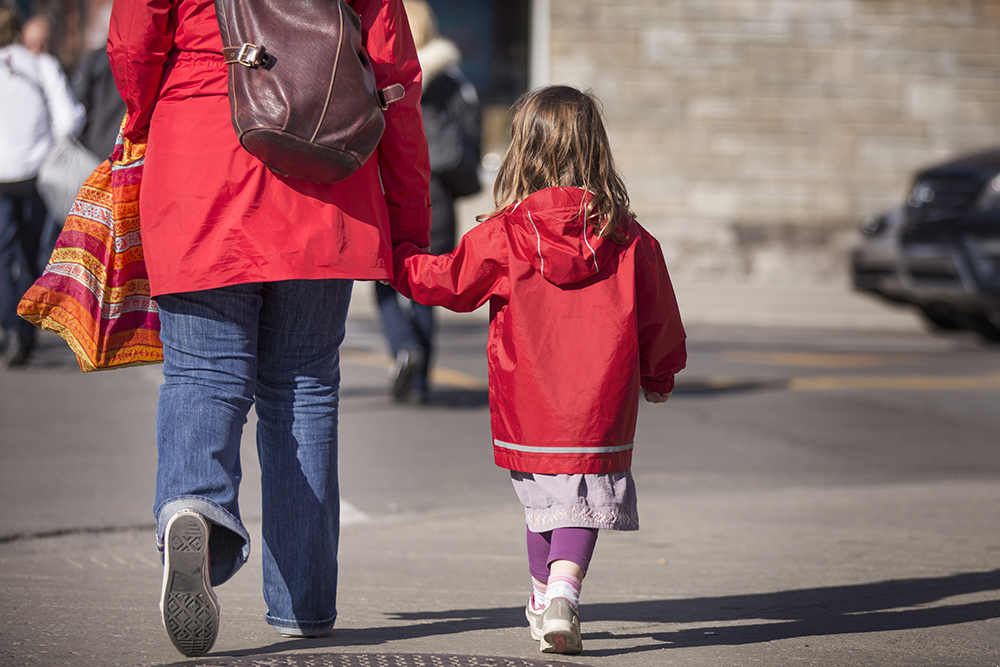
Program enhancements in population studies
Professors from the Urbanisation Culture Société Research Centre have enhanced the master’s and doctoral programs in population studies. Under the direction of Professor María Eugenia Longo, these programs now have five concentrations: family, youth, populations and societies, social statistics, and demographic phenomena and methods. These enhanced programs have had a significant impact on recruitment since Fall 2020.
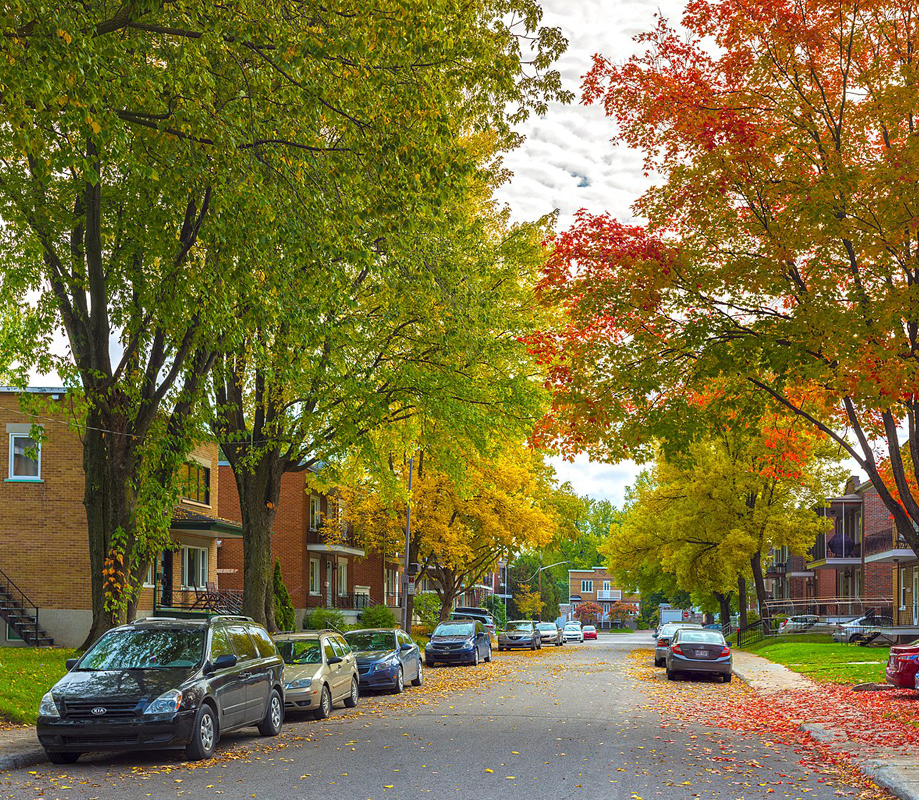
Simon Turcotte – a student who stands out
Simon Turcotte, a doctoral student in urban studies supervised by Marie-Soleil Cloutier, was awarded this year a scholarship from the FRQSC and the SSHRC, as well as the Réal-Décoste scholarship of excellence from the FQRNT. His thesis, entitled “Effets des épisodes de chaleur extrême chez les résidents du quartier Basse-Ville-Limoilou-Vanier et de l’arrondissement Chicoutimi : une analyse des stratégies d’atténuation déployées par les acteurs locaux”, focuses on the effects of heat waves on health and the role of municipalities in dealing with them.
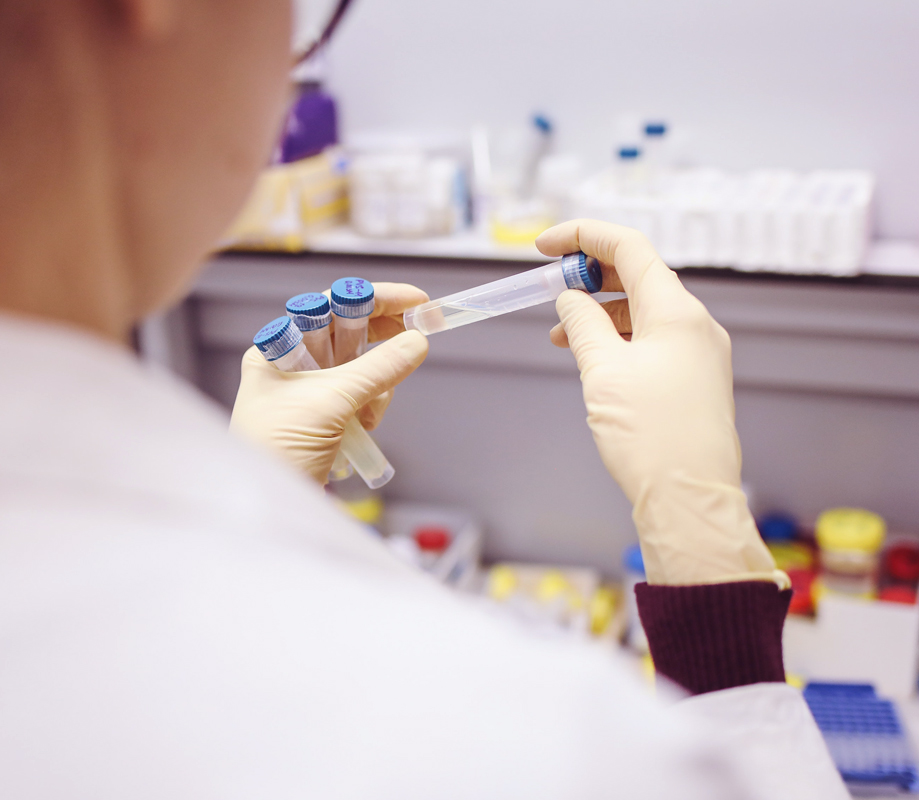
Explaining the science and informing the public
Over the past year, Armand-Frappier Santé Biotechnologie Research Centre scientists have been called upon to play a role in both research and communication. As such, the Research Centre has played a key role in ensuring that information regarding COVID-19 is popularized, validated and adapted to the general public. This democratization of science was ensured by professors Pierre Talbot, Alain Lamarre, Laurent Chatel-Chaix and Nicolas Doucet, who were all very present in the media. In addition, our student members and postdoctoral researchers have stood out by participating in radio shows such as Les années lumière or by popularizing virus biology and vaccine approaches in print medias and on the INRS website.
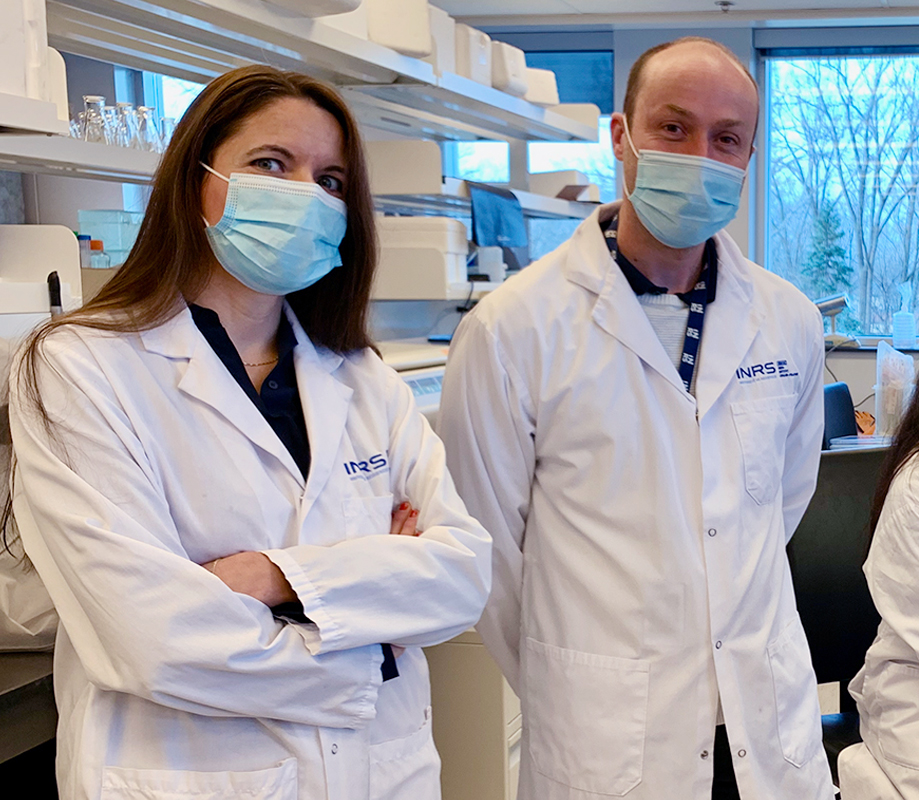
Fighting antibiotic resistance
A research team led by Professor Annie Castonguay and Professor Frédéric Veyrier has discovered a potential treatment for antibiotic-resistant bacteria causing gonorrhea and meningitis. The AFSB Research Centre recognized the commercial potential of the discovery of this inexpensive molecule that could help millions of people around the world and began its commercialization steps with the scientists.

Awarding of a new chair to Professor Monique Lacroix
Professor Lacroix’s new research chair is funded by the Ministère de l’Agriculture, des Pêcheries et de l’Alimentation du Québec and by Agriculture and Agri-Food Canada. Its objective is to develop approaches using natural products to ensure food safety and quality. Professor Annie Castonguay and Professor Steven Laplante are collaborating on the project.
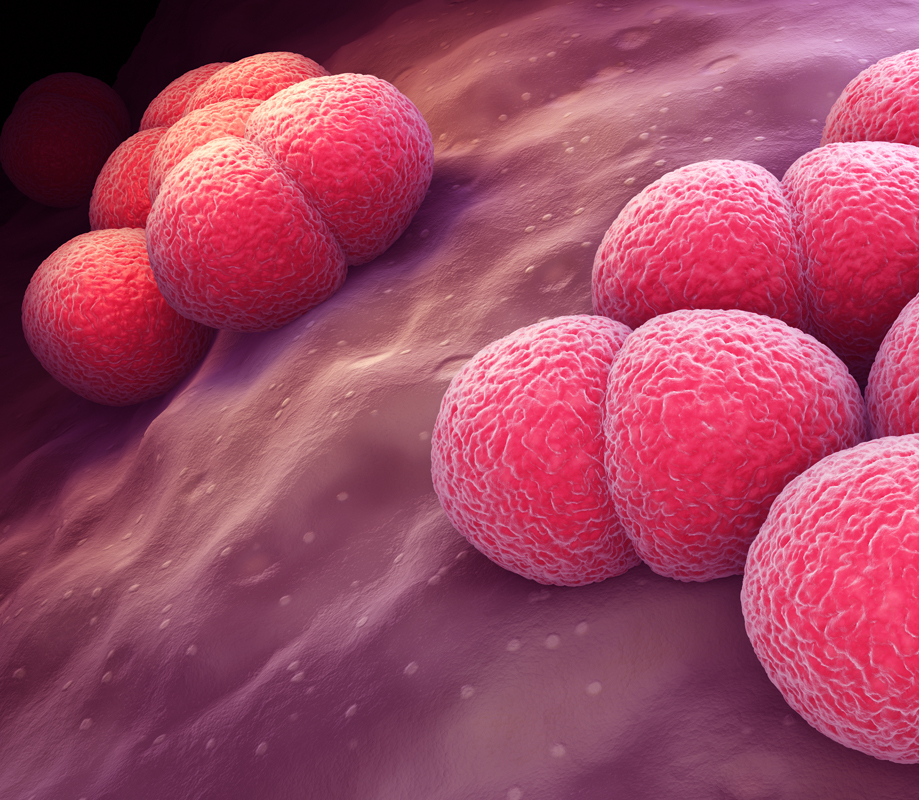
Martin Chenal – a student who stands out
Martin Chenal, a doctoral student in biology under the direction of Professor Frédéric Veyrier, has particularly stood out during this period. Winner of the INRS Ma thèse en 180 secondes contest (May 2020), he won second place in the national final (November 2020). He also presented his work at the Acfas Congress and was named president of the journal La Synthèse, following his term as president of the INRS Student Federation (FEINRS). His work focuses on the evolution of bacteria of the genus Neisseria, particularly the pathogen N. meningitidis, responsible for meningitis.

A promising breakthrough for a better design of electronic materials
Professor Emanuele Orgiu has made a promising breakthrough for materials synthesis in electronics. With his team, he discovered that the right molecular vibrations could increase the speed of electrons in semiconductor materials. This discovery paves the way for the development of even more efficient materials in electronics. Professor Luca Razzari participated in the work published in the prestigious journal Advanced Materials.
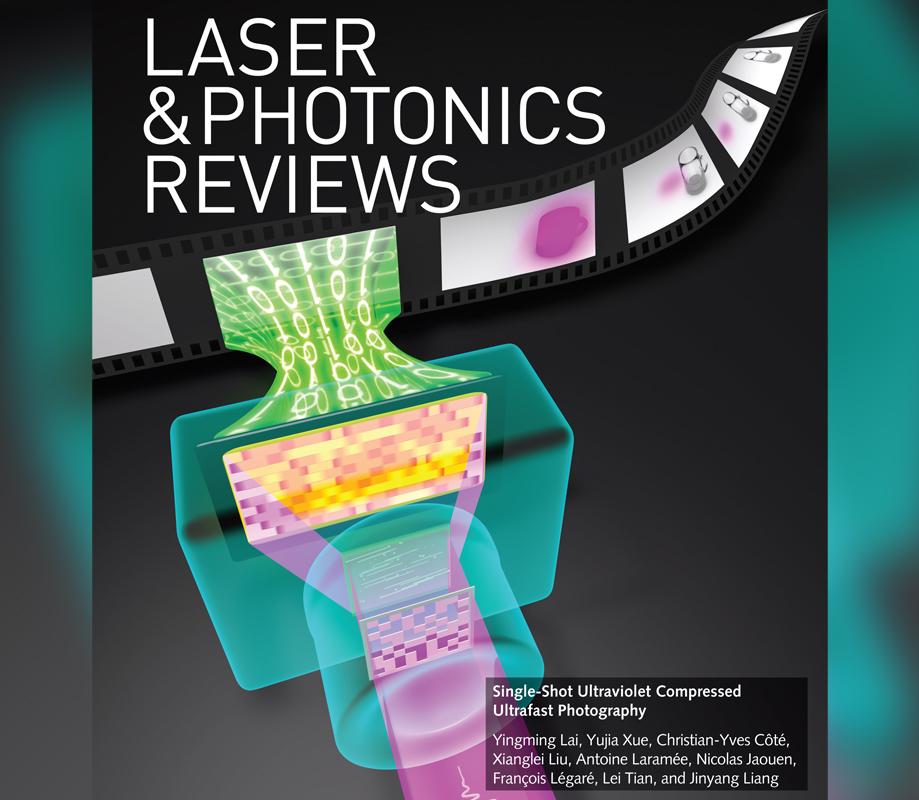
INRS Researchers Design the World’s Fastest UV Camera
Working with an international team of researchers, Professor Jinyang Liang, a specialist in ultra-fast imaging, and his team have developed the world’s fastest camera. This camera can film photons in the ultraviolet (UV) range in real-time and captures the entire process with unprecedented resolution. This original research was featured on the cover of the 10th issue of the journal Laser & Photonics Reviews.

A promising new way to convert solar energy to fuel
Professor Dongling Ma’s team has developed a promising solution to improve the conversion of solar energy into fuel, in collaboration with Professors Aycan Yurtsever and Mohamed Chaker who, it should be noted, also obtained a $9M grant from the CFI for the Micro and Nanotechnology Laboratory. The results of their research were published in the journal Nature Communications.

Toward 6G
Professor Martin Maier and his former doctoral student Amin Ebrahimzadeh published a book on 6G, a world first. Published in January 2021 by Wiley-IEEE Press, the book Toward 6G: A New Era of Convergence offers an up-to-date guide to the emerging 6G vision with its new human-centric services and key enabling technologies.

Three INRS researchers to lead new Canada Research Chairs
Professors Kulbir Ghuman, Dongling Ma and Sophie Van Neste will lead three new Canada research chairs in the fields of computational materials, nanocomposites, and urban climate action. The three researchers will receive a total of $2.6 million in financial support. This significant amount will enable them to pursue their work in their respective fields over the next few years.
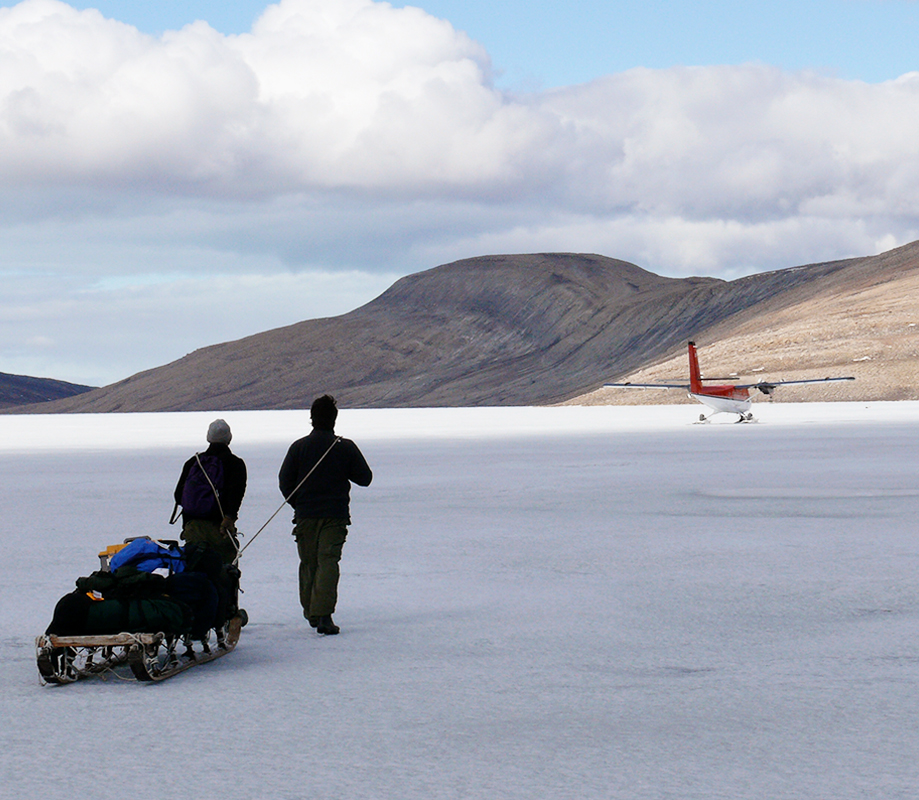
Climate in the Arctic driven by Atlantic temperature cycles
Post-doctoral student François Lapointe and Professor Pierre Francus were able to go back in time and collect data on climate for the last three thousand years with unprecedented precision using sediments located at the bottom of an Arctic lake. Their findings were selected by the magazine Québec Science in the 28th edition of its Québec discoveries of the year. The research was published in the journal Proceedings of the National Academy of Sciences of the USA.
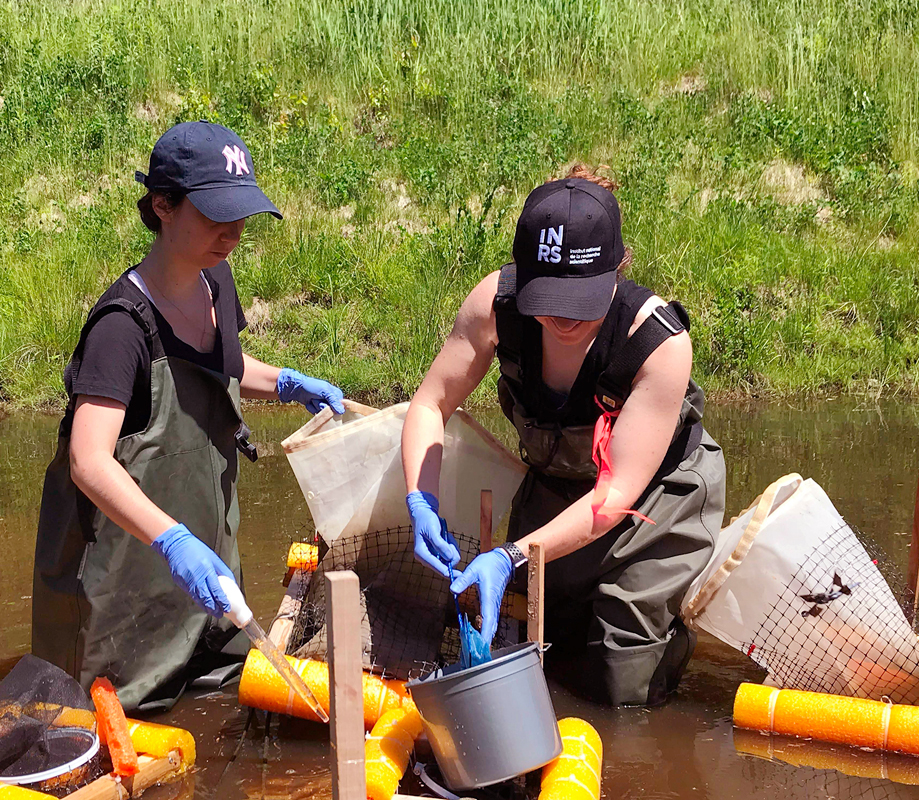
A new Intersectoral Centre for Endocrine Disruptors Analysis at INRS
Through the initiative of Professors Valérie Langlois (Eau Terre Environnement Research Centre) and Isabelle Plante (Armand-Frappier Santé Biotechnologie Research Centre), the Intersectoral Centre for Endocrine Disruptors Analysis (ICEDA) was created in 2020. This research grouping, funded by INRS, promotes international multidisciplinary collaborations on endocrine disruptors. Research topics include environmental health, human health, and environmental policy. The group already has over 100 members in Canada, the United States, Argentina, and various European countries.
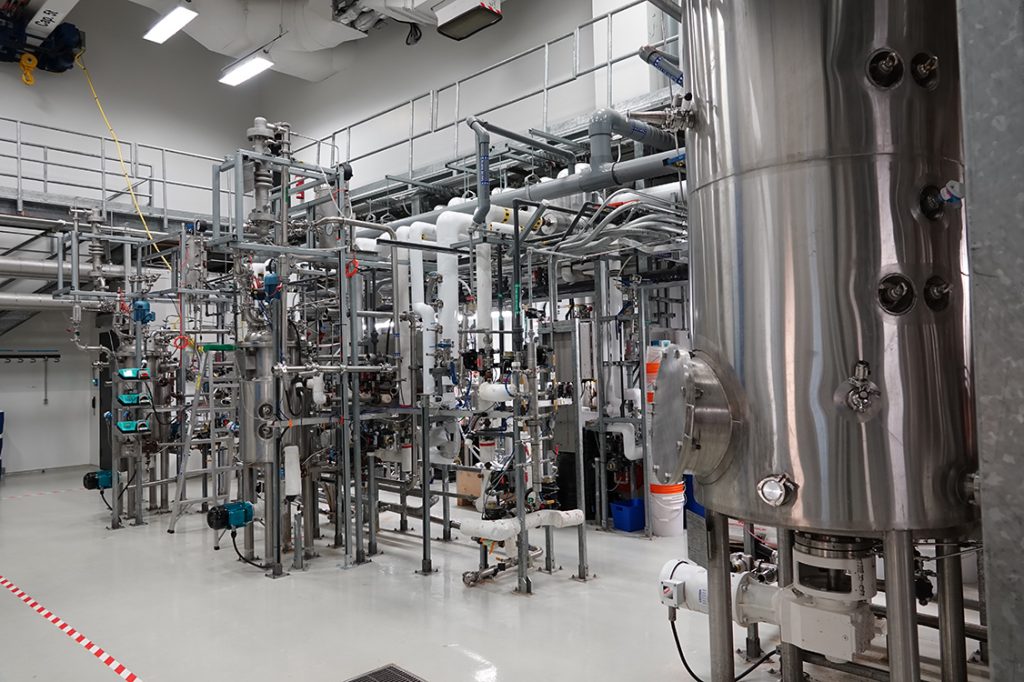
Major work at the Environmental Biotechnology Laboratory (LBE)
With funding from Canada Economic Development in 2017, major renovations to the Environmental Biotechnology Laboratory (LBE) production lines were completed in 2020. This work was supported by efforts from the Buildings and Equipment department, the Partnerships Development Office, and the LBE team. The enhancement of the Laboratory’s equipment has resulted in over 15 partnership projects with local businesses. The hiring of an officer and a research associate has also increased the production capacity of the laboratory to support its growth.

ETE Student congress
Despite the pandemic, the student association of the Eau Terre Environnement Research Centre (AECETE) hosted its annual congress in Fall 2020. Held virtually for the first time, the event consisted of six science popularization workshops and a science cartoon contest. The organizing committee was composed of Laureline Berthot, Véronique Dubos, Laura Malbezin and Paisley Thomson.
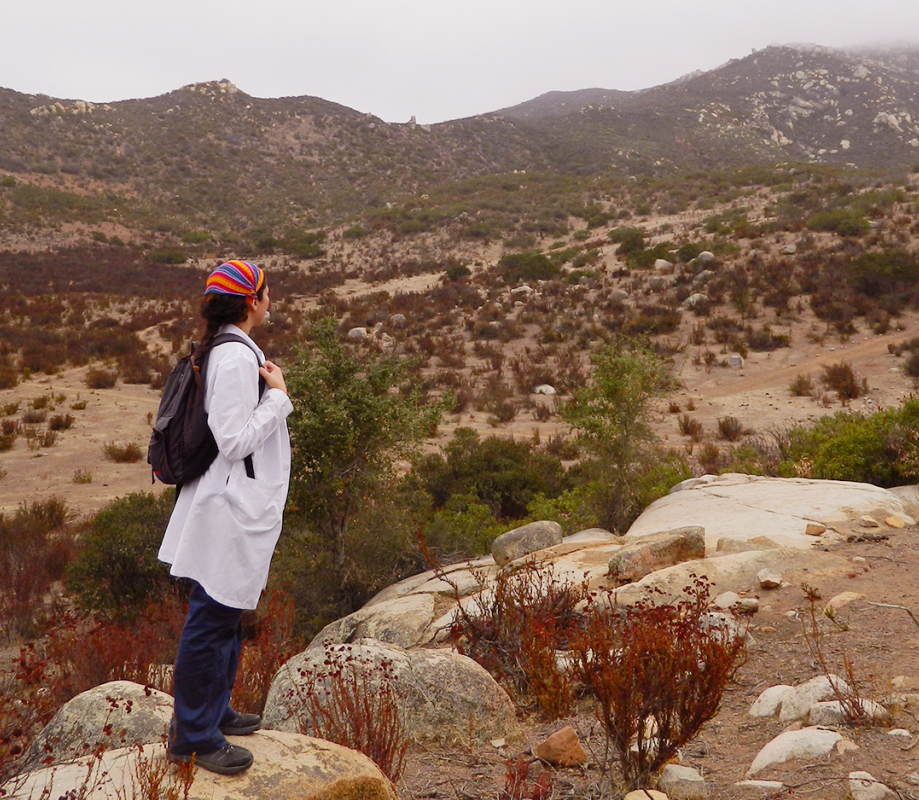
Graduate Linda Lara-Jacobo to travel to Antarctica
With a Ph.D. in ecotoxicology, graduate Linda Lara-Jacobo is taking on a new adventure: a trip to Antarctica in 2022. She is one of 100 women selected to be part of the 6th cohort of the Homeward Bound leadership program, designed to increase the influence of women in science, technology, engineering, mathematics and medicine (STEMM). Her doctoral project, entitled “Embryotoxicité des produits pétroliers dans différentes conditions environnementales chez les poissons et les amphibiens”, was supervised by Professor Valérie Langlois.

Read more
Report to the Community 2020-2021

